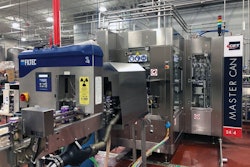
As most people are aware, the Centers for Disease Control and Prevention (CDC) states that the COVID-19 virus is thought to spread mainly from person-to-person through close contact or through respiratory droplets produced when an infected person coughs or sneezes.
According to AIB International’s “Food First” blog in mid-March, most of CDC’s information is based on past experience with other coronavirus outbreaks, though each virus can evolve differently. AIB International states that vigorous enforcement of good hygiene practices, good manufacturing practices, and validated kill-steps are vital in food processing environments. The blog also says processors should use alcohol-based hand sanitizers that contain at least 60 percent alcohol for hand washing, and strictly follow sick employee rules.
The Consumer Brands Association and 60 other industry associations strongly urged federal, state, and local leaders in a March 18 letter to follow federal guidelines in exempting consumer packaged goods (CPG) manufacturing facilities, including suppliers and truck drivers, from gathering restrictions and curfews related to the coronavirus.
By March 19, the government responded, freeing essential workers to continue. The list below identifies workers who conduct a range of operations and services that are essential to continued critical infrastructure viability, including staffing operations centers, maintaining and repairing critical infrastructure, operating call centers, working construction, and performing management functions, among others. The industries they support represent, but are not necessarily limited to, medical and healthcare, telecommunications, information technology systems, defense, food and agriculture, transportation and logistics, energy, water and wastewater, law enforcement, and public works.
While food industry leaders are doing all they can to protect the supply chain, disruptions such as ingredients not coming in from foreign supplies, may occur.
“Currently, there are adequate processed food supply reserves in the pipeline," says Dave Park, principal at Food Defense, LLC. Ultimately, the risk of future shortages in some food segments will force processors to adapt to rapidly changing patterns of consumer spending and their traditional vectors of accessibility to food, Park adds. "Depending upon the actual degree of adverse food and transportation public health consequences, financial market uncertainties, loss of employment of trained food segment employees, food-worker and transportation labor shortages and impacts of social and physical distancing, there will be some noticeable disruptions in food manufacturing, food distribution and just-in-time retail food deliveries. Those food manufacturers who already have continuity of operations plans (COOP) prepared, in place and practiced as part of a total food protection plan will fare the best in weathering our current Covid-19 public health crisis,” he states.

























